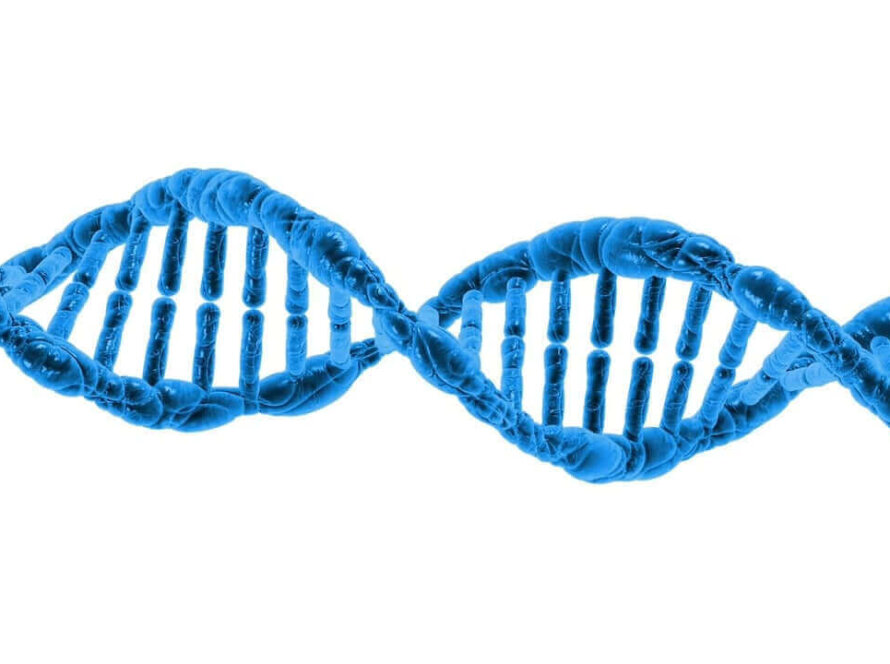Estimated reading time: 13 minutes
High protein cheese? The mere mention of the word conjures up images of fine wine, crackers and grapes in a stuffy living room while someone with an English accent lectures you on proper cheese etiquette.
Cheese is one of those things that people seem to love or hate. There’s rarely any middle ground. But what if I told you that cheese is actually good for you? In fact, it contains a bunch of protein and other essential nutrients that your body needs to function properly.
What is cheese and where does it come from?
Just in case you did not already know, cheese factories make cheese from milk. They process the milk and remove the cream leaving behind the solids. The cheesemaker will stir in rennet (a natural enzyme) and leave it to form curds. They wait for the curds to form and then strain it, removing the whey(the liquid left over) in the process. Lastly they salt, age and package the cheese.
You can make cheese from the milk of cows, goats, sheep or pigs. Furthermore, you can use whole milk, reduced-fat milk or skim milk. The type of cheese which the factory will produce depends on 4 main variables. Namely, the type of milk they use, the bacteria they add, how long they leave it to ferment and at what temperature they age it.
There are hundreds of different types of cheese available in grocery stores today. Some of the most popular types of cheese include cheddar, brie, blue cheese as well as swiss cheese and mozzarella.
For the record, my favourite cheese is the Kit Calvert from Wensleydale (not an affiliate link, I really do love it!) paired with their sticky chutney!
How much protein is in cheese?
Cheese contains anywhere from 6g-40g of protein per 100g serving size depending on the variety. There are many variables to these numbers but the takeaway from this is that cheese is a very good source of protein.
Which high-protein cheese tops the list?
Of course, not all cheeses are equal in quality, nutrients or price. In the list below we rank the highest protein cheeses per 100g in reverse order.
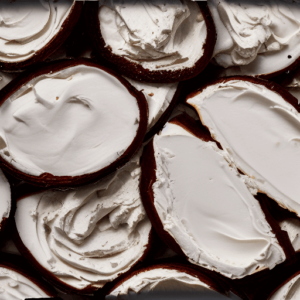
20. Cream Cheese 8.2g
PROTEIN: 8.2g | FAT: 34.87g | CARBOHYDRATES: 2.66g
A 100g serving of Cream Cheese cheese contains about 8g of protein. This makes it a good source of protein for those looking to add some extra protein to their diet. It can be eaten on its own as a snack or added to dishes like salads and pasta for an extra boost of protein.
19. Ricotta 10.1g
PROTEIN: 10.1g | FAT: 12.69g | CARBOHYDRATES: 3.17g
A 100g serving size contains about 10g of protein. Ricotta is the perfect addition to pancakes, smeared on toast and also great in oatmeal.
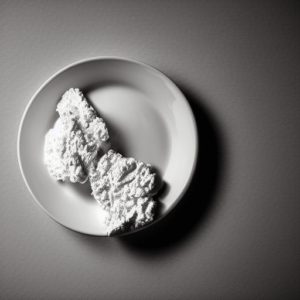
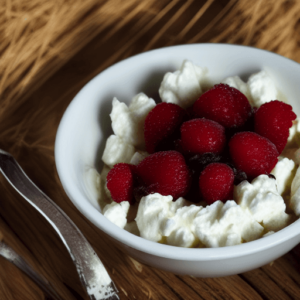
18. Cottage Cheese 15.4g
PROTEIN: 15.4g | FAT: 4.51g | CARBOHYDRATES: 2.68g
Cottage Cheese is a great base for protein puddings. It has the same texture and flavour as Ricotta, but with much less fat content to make it healthier! Plus you can’t argue about how tasty cottage cheese truly tastes-everyone seems to love this creamy dairy staple dish no matter what their opinion on food usually entails
Sophisticated yet simple at once, light yet rich in calcium-rich textures that melt into your mouth like silk… A 100g serving of Cottage Cheese cheese contains about 15g of protein.
17. Feta 17.4g
PROTEIN: 17.4g | FAT: 21.28g | CARBOHYDRATES: 4.09g
The unique taste of this cheese will have you coming back for more! It’s made from a combination of milk including sheep, goat or cows and is best served crumbled over a salad or baked in the oven.
A 100g serving of feta cheese contains about 17g of protein, making it a great choice for anyone looking to add some extra protein to their diet.
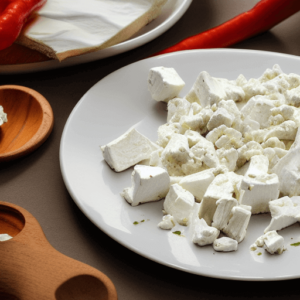
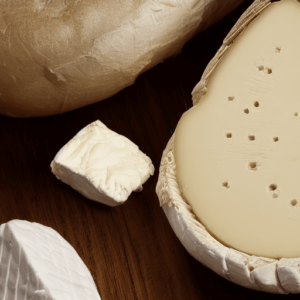
16. Chèvre 18g
PROTEIN: 18.0g | FAT: 21.42g | CARBOHYDRATES: 3.57g
Chèvre, or “goat” cheese as it’s also known can be soft and spreadable when fresh but dries out with age. It develops stronger flavours over time that are tangy-sweet or mouldy smells depending on what kind you choose!
Aged chèvres have longer ageing periods where they become more crumbly in texture while developing deep golden hues due to drying processes.
15. Brie / Camembert 18.6g
PROTEIN: 18.6g | FAT: 27.68g | CARBOHYDRATES: 0.45g
A soft, creamy cheese that is made from cow’s milk. It is often described as having a nutty, earthy flavour and a slightly sour taste. A 100-gram serving contains about 19 grams of protein.
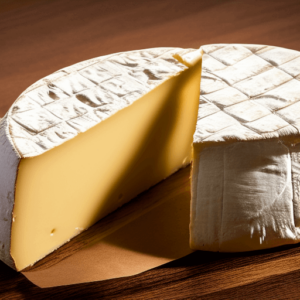
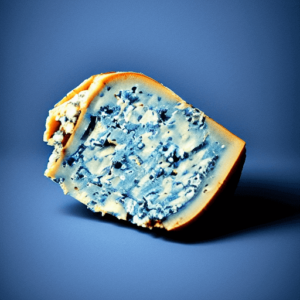
14. Blue cheese 20.3g
PROTEIN: 20.3g | FAT: 28.74g | CARBOHYDRATES: 2.34g
Blue cheese is a type of cheese that is made from cow’s milk. It has a smooth, creamy texture and a strong, pungent flavour. A 100-gram serving of blue cheese also contains about 20 grams of protein.
13. Halloumi 21.3g
PROTEIN: 21.3g | FAT: 25.0g | CARBOHYDRATES: 0.0g
Golden yellow cheese with a delicious flavour that’s best enjoyed when grilled or fried to give it an extra crispy exterior, but still remaining soft and gooey inside. Try this wonderful addition for your next salad lunch!
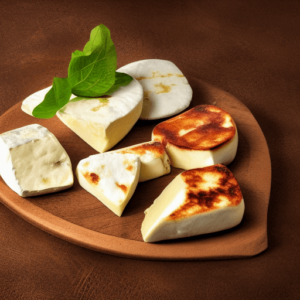
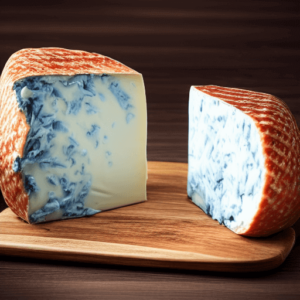
12. Gorgonzola 21.4g
PROTEIN: 21.4g | FAT: 28.74g | CARBOHYDRATES: 2.34g
Gorgonzola is a soft, blue cheese that ranges from mild and creamy to sharp. It contains earthy elements with salty tastes when it’s old enough for several months or even years in storage before eating!
11. Roquefort 21.54g
PROTEIN: 21.54g | FAT: 30.64g | CARBOHYDRATES: 2.0g
It contains about 22 grams of protein per 100-gram serving, making it an excellent choice for anyone looking to increase their daily intake. So if you’re looking for a way to add some extra protein to your diet, look no further than Roquefort cheese!
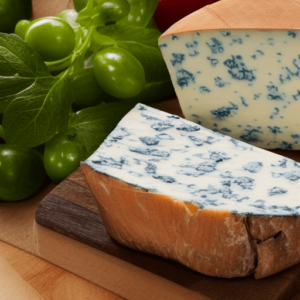
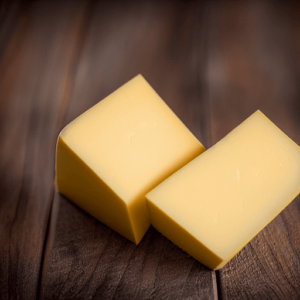
10. Colby 24.0g
PROTEIN: 24.0g | FAT: 32.11g | CARBOHYDRATES: 2.57g
Colby Cheese is the perfect cheese for everyday cooking. It has a mild flavour that can be used in any dish or recipe, making it great to have around when you’re looking for something simple but delicious!
9. Cheddar Cheese 24.9
PROTEIN: 24.9g | FAT: 33.14g | CARBOHYDRATES: 1.28g
It is a type of cheese and is made from cow’s milk. A 100-gram serving of cheddar cheese contains about 25 grams of protein. Some popular brands of cheddar include Kraft, Cracker Barrel and Cabot.
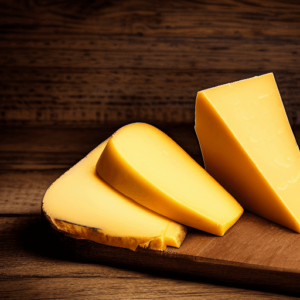
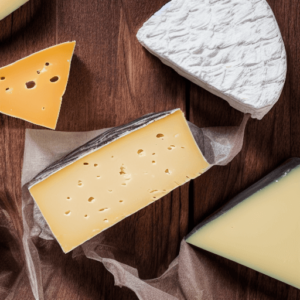
8. Gloucester 25.0g
PROTEIN: 25.0g | FAT: 35.71g | CARBOHYDRATES: 0.00g
Gloucester Cheese has been made in the same place for over six centuries. As a result, along with its rich, creamy flavour comes memories of bygone days and old-world charm that will make you want another bite!
Gloucestershire’s most famous export is this semi-hard cheese called “Gloucester.” It pairs nicely with fruit flavours such as apples or pear sauce but also goes well when combined with wine dinner time!
7. Provolone 25.5g
PROTEIN: 25.5g | FAT: 26.62g | CARBOHYDRATES: 2.14g
Provolone cheese is a type of Italian cheese that is made from cow’s milk. It has a smooth, creamy texture and a mild, slightly salty flavour. A 100-gram serving of Provolone cheese contains about 26 grams of protein. Great for melting on a panini with roast peppers!
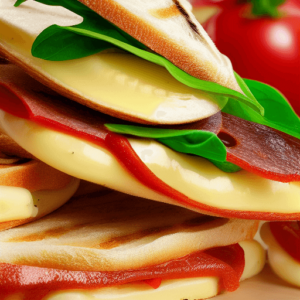
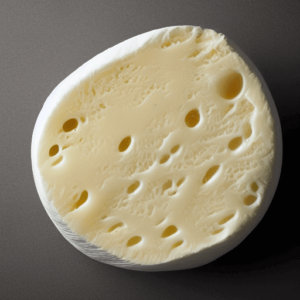
6. Mozzarella 26.0g (The tastiest high protein cheese)
PROTEIN: 26.0g | FAT: 22.35g | CARBOHYDRATES: 2.19g
Mozzarella is a popular cheese that is often used in pizza and pasta dishes. It is made from cow’s milk and has a slightly salty taste. Additionally, a 100-gram serving of Mozzarella cheese contains about 26 grams of protein. Some popular brands of Mozzarella cheese include BelGioioso, Grana Padano and Sartori.
5. Gouda – 26.2
PROTEIN: 26.2g | FAT: 27.44g | CARBOHYDRATES: 2.22g
The Dutch have a reputation for making some of the best cheeses on earth, and Gouda is no exception. This cheese that has been specifically designed to have an earthy flavour with notes of ripened fruit. It’s perfect on its own or mixed into other cheeses like brie and camembert and is at home on a cheese platter!
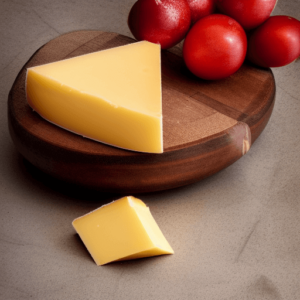
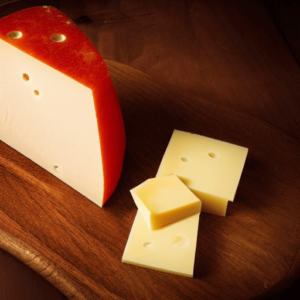
4. Edam 27.5g
PROTEIN: 27.5g | FAT: 27.8g | CARBOHYDRATES: 1.43g
You don’t need to be a professional chef or have any culinary knowledge at all, just use this one cheese and you’ll end up with an amazing grilled sandwich that your guests will love!
3. Pecorino 28.0g
PROTEIN: 28.0g | FAT: 26.9g | CARBOHYDRATES: 3.6g
The sharpness of an Italian cheese is wonderful grated on zucchini pasta dishes as well as lasagnes. It’s a little sharper and saltier than Parmesan
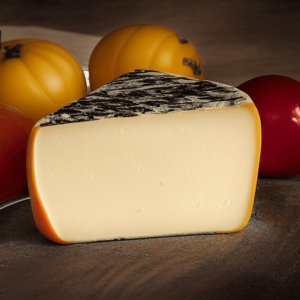
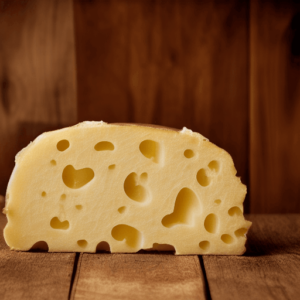
2. Swiss Cheese 28.4 (My number one for High Protein Cheese)
PROTEIN: 28.4g | FAT: 27.8g | CARBOHYDRATES: 5.38g
Swiss cheese is a type of cheese that is made in Switzerland. It is a type of Emmental cheese and is made from cow’s milk. A 100-gram serving of Swiss cheese contains about 28 grams of protein.
Swiss cheese tastes great, so be careful with your portion sizes as it is quite high in fat.
1. Parmesan 35.1g – The Highest Protein Cheese
PROTEIN: 35.1g | FAT: 28.8g | CARBOHYDRATES: 5.04g
Parmesan cheese is the highest-protein cheese available. A 100-gram serving contains about 35.1 grams of protein. Consequently, you probably wouldn’t eat as much parmesan as other cheeses but it does add a bold and nutty flavour to any pasta dish!
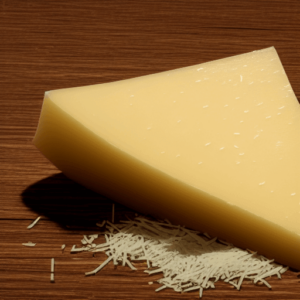
The benefits of eating high protein cheese
Cheese is a good source of protein and calcium, as well as vitamins A and B12. Protein is essential for building muscle mass and calcium is necessary for strong bones. Vitamin A is important for eye health and B12 is essential for nerve function and energy production. Cheese also contains other nutrients such as zinc, magnesium and phosphorus that are important for overall health.
The disadvantages of eating high protein cheese
Although cheese is a nutritious food, it does have some disadvantages. It is high in saturated fat and cholesterol and can contribute to heart disease and obesity if eaten in large quantities.
Cheese also tends to be high in sodium, which can increase blood pressure.
Another disadvantage of eating cheese: I sometimes pair it with wine, which in some cases can result in a headache the next day 🙂
How to include more high protein cheese in your diet
Cheese is a good source of protein, calcium, and other essential nutrients you can add to your diet.
- Try pairing cheese with wine. It’s a classic combination that can help you reach your daily protein goals. Just be sure to drink plenty of water afterwards to avoid a headache the next day!
- Incorporate cheese into your cooking. Furthermore, shredded cheese on top of pasta or adding chunks of cheese to soup are easy ways to get your daily dose of dairy.
- Get creative with your snacks. Instead of reaching for a bag of chips, try munching on some crackers with cheddar cheese or making yourself a fruit and yoghurt parfait topped with crumbled blue cheese.
Did you find this article helpful? Do you have any suggestions or comments, drop a comment below.


